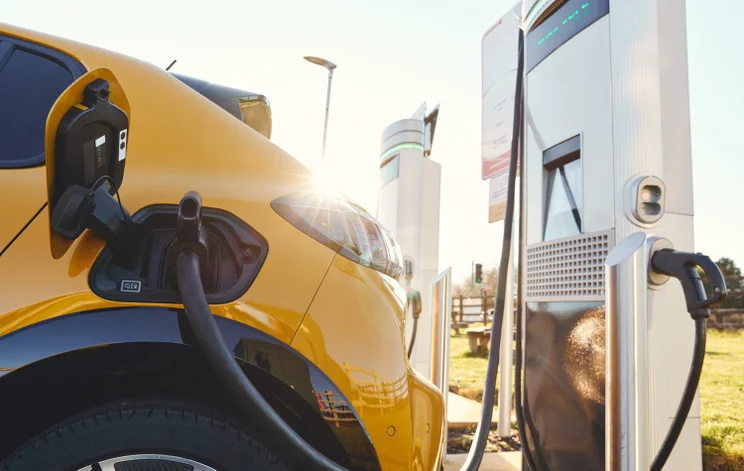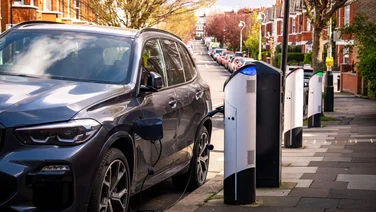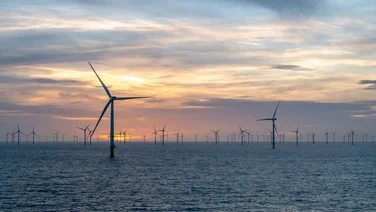We receive a small fee from trusted installers when you request a quote through our site. This helps us keep our content independent, well-researched and up to date – Learn more
- Ford EV sales were 324% higher in the first six months of 2025 than 2024
- Car manufacturers transitioning to EVs could increase UK economic output by £16bn
- It could also create upwards of 167,000 new jobs

The biggest car manufacturers in Europe more than doubled their electric vehicle (EV) sales in the first six months of 2025 compared to the same period in 2024, according to analysis of global sales from New Automotive.
The data reveals that some companies have even quadrupled their sales, with the likes of Ford, Renault and Mini seemingly making a successful shift towards sustainability.

Get free solar panel quotes
Answer a few quick questions, and our trusted installers will send you bespoke solar panel quotes – for free.
Colin Walker, Head of Transport at the Energy & Climate Intelligence Unit (ECIU), said “traditional brands” are “fighting back” and “dramatically increasing the number of EVs they sell.”
“Legacy manufacturers are proving more than capable of making the transition to building the electric cars of the future with European manufacturers dominating,” Walker said.
Ford saw a slow start to 2024, starting the year with just one EV model on sale, but in the first six months of 2025, sales were 324% higher as the legacy manufacturer introduced new models such as the affordable Ford Puma Gen-E.
If you’re interested in government grants for solar panels, read our dedicated guide.
In another instance, Mini has seen a 160% increase in EV sales, building many at its plant in Oxford. European manufacturers dominate the rest of the list:
- Renault: 251% increase
- Porsche: 203% increase
- VW: 201% increase
- Skoda: 143% increase
- Peugeot: 112% increase
- Cupra: 109% increase
Ben Nelmes, Chief Executive of New Automotive, said: “The race to go electric is on, and our new data separates the sprinters from the stragglers.
“It is fantastic to see legacy brands like Ford, Renault, and the UK’s own Mini delivering for drivers with a colossal surge in EV sales.
“The message to the laggards is simple: get on and build the brilliant EVs of the future, or prepare to be left behind.”
However, other major manufacturers have experienced the worst performing car sales. Honda’s EV sales were down 92% in the first six months of 2025 compared to 2024, Mazda fell by 76% and Toyota experienced a 41% fall.
Nissan saw a 69% fall but upgrades to its factory in Sunderland are currently underway in order to build three new EV models – the new Leaf, the new Qashqai, and the new Juke. It’s likely that these models will drive significant uptake in Nissan EV sales, as well as solidifying the status of British EV manufacturing in the North East.
BYD, relatively new to the European market but well established in China, have seen an increase in sales, while other Chinese manufacturers such as MG experienced a 35% fall in EV sales.
In a report commissioned by the ECIU, CBI Economics revealed the dangers to the UK economy should the motor industry fail to transition to EVs. Its contribution to the UK economy could fall by as much as 73%, or £34.1bn, with over 400,000 jobs lost as a result. On the other hand, economic output could see a £16bn increase, with 167,000 new jobs created, should a successful transition occur.
Walker said that the stakes for the car industry “could not be higher,” explaining how CBI Economics analysis shows “the UK’s car industry can only survive and thrive if it makes a rapid transition to building electric vehicles.”
He said that “a refusal to do so, and remaining stuck building the petrol and diesel cars of the past, would be a recipe for mass redundancies and factory closures.
“The good news for the UK is that, with the likes of Mini, Nissan and Jaguar Land Rover all making decisive shifts towards building EVs, the UK’s car industry has every chance of securing a successful and prosperous future in an electrified world.”
The Government has been called upon for critical support in bolstering the economy and supporting EVs, including the need for a stable and regulatory environment. This is currently upheld by schemes such as the ZEV Mandate, but more has to be done to meet climate goals and reduce the UK’s reliance on fossil fuels.









